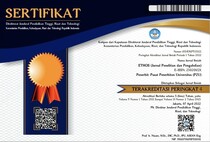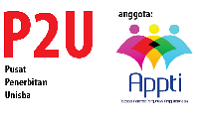PEMBERDAYAAN KETERAMPILAN MITIGASI BENCANA BERBASIS PROJECT BASED LEARNING
Abstract
Flooding is a problem that often occurs in urban areas. The flood disaster that occurred in early 2020 left various negative impacts on the environment. This causes flooding to become a problem that must be solved. The purpose of this activity is to empower flood mitigation skills in the community through environmental seminars. The method of activities carried out is by lectures and discussions in seminars. Data collection using the instruments used are test questions and questionnaires related to flood mitigation. Analysis of the data used is to compare the average results between before and after the activity. The results of this activity indicate that the knowledge score has increased from before (28.45) to be higher after the activity (34.93), as well as related to previous flood mitigation behavior (66.62) and has increased after (70.52). In addition, seminar participants are required to create a project. This indicates that this Project Based Learning (PjBL)-based environmental seminar has become an educational innovation
Banjir merupakan sebuah masalah yang sering terjadi di wilayah perkotaan. Bencana banjir yang terjadi pada awal tahun 2020 menyisakan berbagai dampak negatif bagi lingkungan. Hal ini menyebabkan banjir menjadi sebuah masalah yang harus diselesaikan. Tujuan dari kegiatan ini adalah untuk memberdayakan keterampilan mitigasi banjir pada masyarakat melalui seminar lingkungan. Metode kegiatan yang dilaksanakan adalah dengan ceramah dan diskusi dalam seminar. Pengumpulan data menggunakan instrumen yang digunakan adalah soal tes dan kuesioner terkait dengan mitigasi banjir. Analisis data yang digunakan adalah dengan membandingkan hasil rata-rata antara sebelum dan sesudah kegiatan. Hasil dari kegiatan ini menunjukkan bahwa skor pengetahuan mengalami peningkatan dari sebelum (28.45) menjadi lebih tinggi sesudah kegiatan (34.93), begitu juga terkait dengan perilaku mitigasi banjir sebelumnya (66.62) dan mengalami peningkatan sesudahnya (70.52). Selain itu, peserta seminar diharuskan membuat sebuah proyek. Hal ini menandakan bahwa kegiatan seminar lingkungan berbasis Project Based Learning (PjBL) ini menjadi sebuah inovasi pendidikan.
Keywords
Full Text:
PDFReferences
Al-Balushi, S. M., & Al-Aamri, S. S. (2014). The effect of environmental science projects on students environmental knowledge and science attitudes. International Research in Geographical and Environmental Education, 23(3), 213–227. https://doi.org/10.1080/10382046.2014.927167
Bahri, S., Simbolon, M., & Rettob, A. L. (2021). Pelatihan Pembuatan Bahan Ajar Online Berbasis Web Pada Sekolah Menengah Kejuruan Negeri 1 Tanah Miring. Ethos: Jurnal Penelitian Dan Pengabdian Kepada Masyarakat, 9(2), 248–259.
Buzov, I. (2014). Social network sites as area for students’ pro-environmental activities. Procedia - Social and Behavioral Sciences, 152, 1233–1236. https://doi.org/10.1016/j.sbspro.2014.09.304
Cheng, J. C. H., & Monroe, M. C. (2012). Connection to nature: Children’s affective attitude toward nature. Environment and Behavior, 44(1), 31–49. https://doi.org/10.1177/0013916510385082
Gampell, A. V., Gaillard, J. C., Parsons, M., & Fisher, K. (2017). Beyond stop disasters 2.0: An agenda for exploring the contribution of video games to learning about disasters. Environmental Hazards, 16(2), 180–191. https://doi.org/10.1080/17477891.2016.1275502
Jonell, M., Crona, B., Brown, K., Rönnbäck, P., & Troell, M. (2016). Eco-labeled seafood: determinants for (blue) green consumption. Sustainability, 8(9), 1–19. https://doi.org/10.3390/su8090884
Kanchanabhandhu, C., & Woraphong, S. (2016). A model of solid waste management based multilateral co-operation in semi-urban community. International Journal of Environmental and Science Education, 11(12), 5762–5775.
Knowlton, D. S., & Sharp, D. C. (2015). Students’ opinions of instructional strategies in a graduate-level creativity course. International Journal for the Scholarship of Teaching and Learning, 9(2), 1–12. http://digitalcommons.georgiasouthern.edu/ij-sotl/vol9/iss2/6
Lee, A. Y. L. (2016). Media education in the school 2.0 era: Teaching media literacy through laptop computers and iPads. Global Media and China, 1(4), 435–449. https://doi.org/10.1177/2059436416667129
Marlina, E. T., Harlia, E., Hidayati, Y. A., & Badruzzaman, D. Z. (2021). Penyuluhan Pengolahan Limbah Ternak Dalam Upaya Mengurangi Emisi Gas Rumah Kaca. Ethos: Jurnal Penelitian Dan Pengabdian Kepada Masyarakat, 9(2), 307–315.
Muthukrishnan, R., & Kelley, J. E. (2017). Depictions of sustainability in children’s books. Environment, Development and Sustainability, 19(3), 955–970. https://doi.org/10.1007/s10668-016-9778-7
Ng, C. (2018). “I learn for a job promotion!”: the role of outcome-focused career goals in motivating distance learners to learn. Distance Education, 39(3), 390–410. https://doi.org/10.1080/01587919.2018.1476839
Saleh, R., & Filawati, F. (2019). Efektifitas penerapan model pembelajaran kooperatif tipe students team achievement division dalam meningkatkan aktivitas dan hasil belajar kognitif siswa. Edubiotik : Jurnal Pendidikan, Biologi Dan Terapan, 4(02), 75–82. https://doi.org/10.33503/ebio.v4i02.449
Seechaliao, T. (2017). Instructional strategies to support creativity and innovation in education. Journal of Education and Learning, 6(4), 201–208. https://doi.org/10.5539/jel.v6n4p201
Slavoljub, J., Zivkovic, L., Sladjana, A., Dragica, G., & Zorica, P. S. (2015). To the Environmental Responsibility among Students through Developing their Environmental Values. Procedia - Social and Behavioral Sciences, 171, 317–322. https://doi.org/10.1016/j.sbspro.2015.01.128
Sparrow, R., Dartanto, T., & Hartwig, R. (2020). Indonesia Under the New Normal: Challenges and the Way Ahead. Bulletin of Indonesian Economic Studies, 56(3), 269–299. https://doi.org/10.1080/00074918.2020.1854079
Talmi, I., Hazzan, O., & Katz, R. (2018). Intrinsic motivation and 21st-century skills in an undergraduate engineering project: the formula student project. Higher Education Studies, 8(4), 46. https://doi.org/10.5539/hes.v8n4p46
Xia, B. S. (2017). An In-Depth Analysis of Teaching Themes and the Quality of Teaching in Higher Education: Evidence from the Programming Education Environments. International Journal of Teaching and Learning in Higher Education, 29(2), 245–254.
Yusnaeni, Y., Corebima, A. D., Susilo, H., & Zubaidah, S. (2017). Creative Thinking of Low Academic Student Undergoing Search Solve Create and Share Learning Integrated with Metacognitive Strategy. International Journal of Instruction, 10(2), 245–262. https://doi.org/10.1016/j.spinee.2011.10.010
DOI: https://doi.org/10.29313/ethos.v10i1.7910
Refbacks
- There are currently no refbacks.
Alamat Redaksi:
LPPM Unisba, Lantai 2, Jl. Purnawarman 63, Bandung 40116, Jawa Barat, (022) 4203368 , (022) 4264064. ethos.unisba@gmail.com / ethos@unisba.ac.id

This work is licensed under a Creative Commons Attribution-NonCommercial-ShareAlike 4.0 International License.














